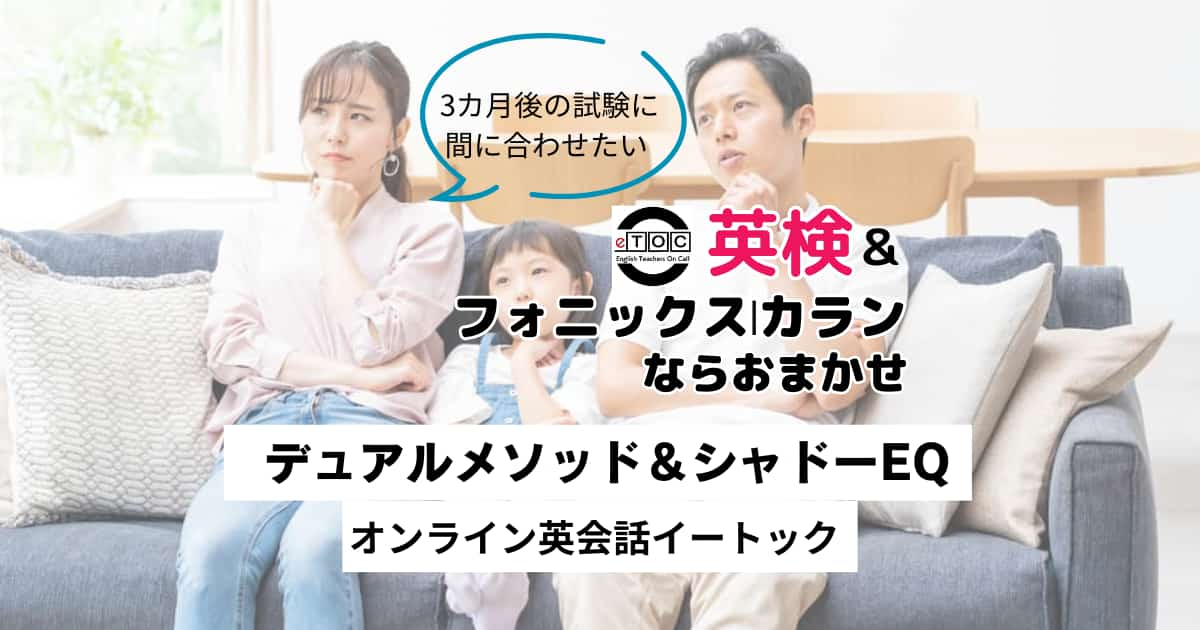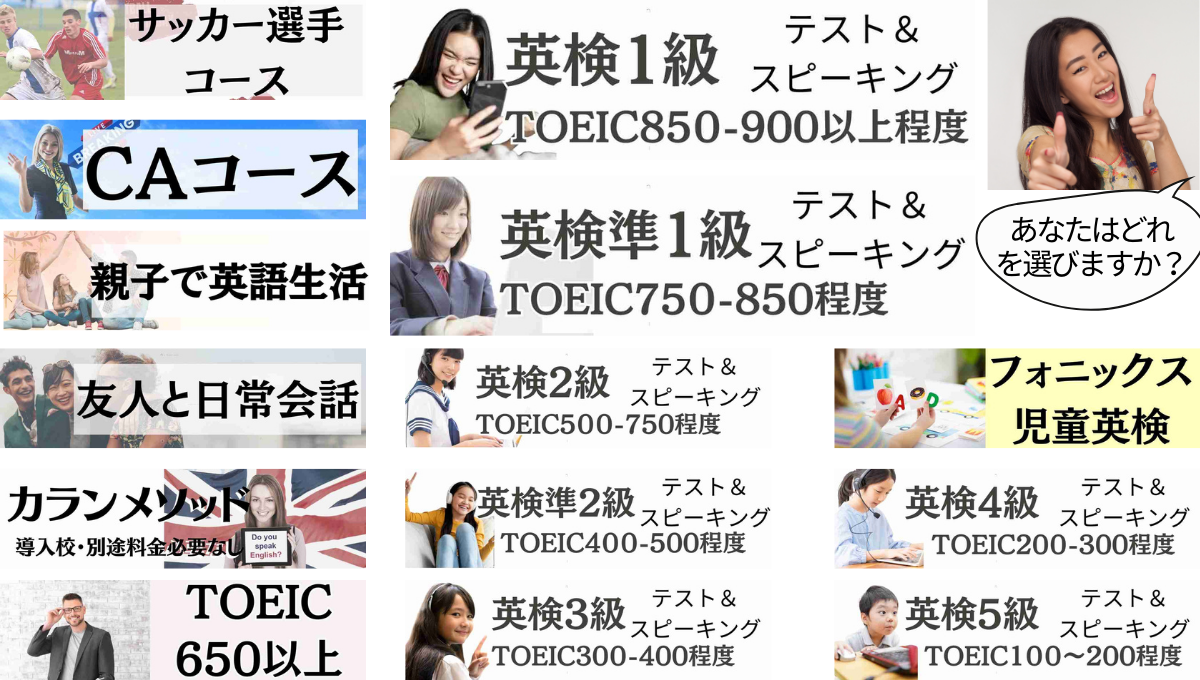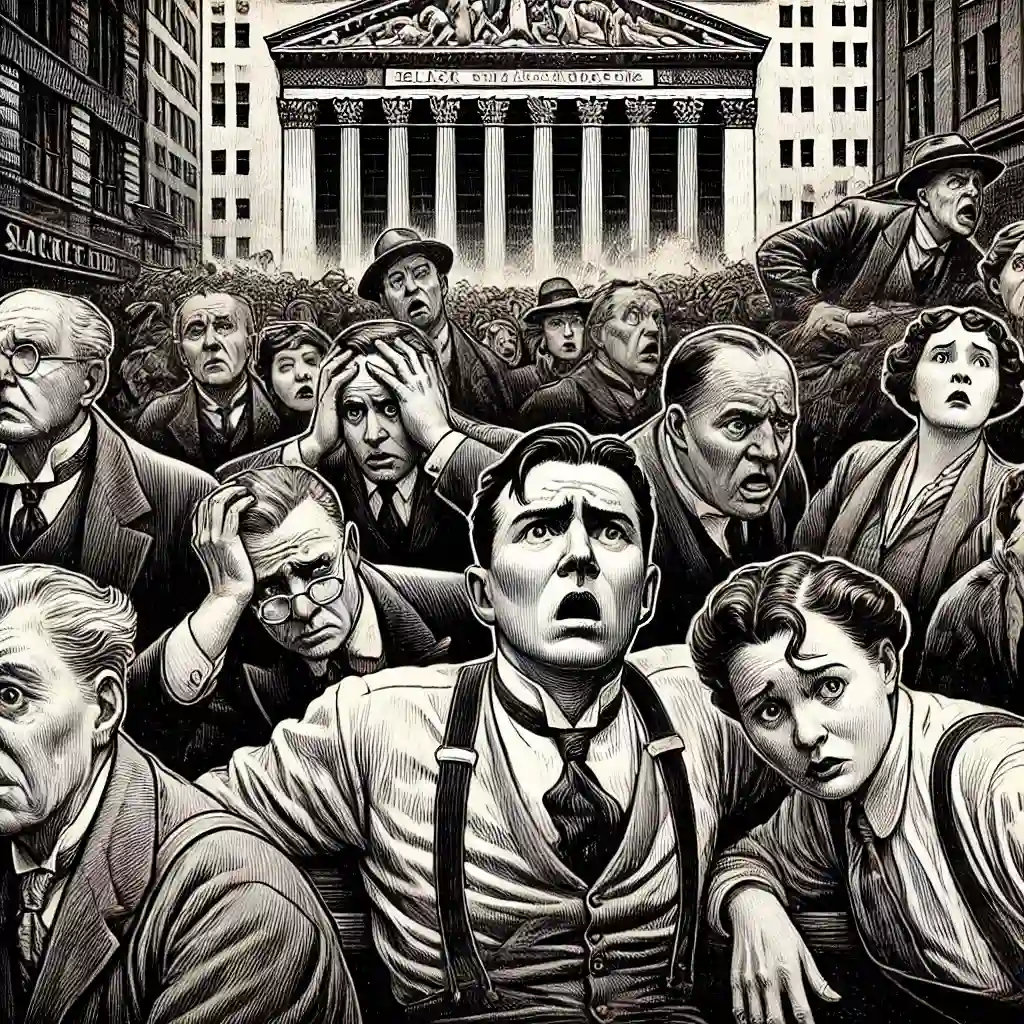Black Thursday – The Day the World Went Whoops
この英語教材のテーマは「実際の出来事でカジュアルな英語を学ぶ」
The theme of this English resource is “Learn casual English through real events.”
1. What Happened on Black Thursday?
Alright, folks, let’s take a trip back to 1929. Picture this: it’s a regular Thursday in New York City, people are sipping coffee, chatting about their day, and then – BAM! The stock market decides to do a nosedive. It wasn’t just any dip; it was more like a full-on cannonball into the deep end of a very empty pool. Stocks crashed, investors panicked, and chaos ruled the day. This event kicked off what we now call the Great Depression. Oh, and by the way, because it happened on a Thursday, they fittingly named it “Black Thursday.” Kinda makes you think twice about getting too excited for the weekend, huh?
Q1: What are your thoughts on this part of the article?
- Sample Answer: “I think it’s interesting how such a normal day turned into something so chaotic. The way the writer described it made it easy to imagine the sudden panic.”
Q2: Please summarize this article.
- Sample Answer: “This part of the article explains how the stock market crashed on Black Thursday in 1929, causing widespread chaos and marking the start of the Great Depression.”
Q3.Let me know if you have any questions.
1. 暗黒の木曜日に何が起こったのか?
さて皆さん、1929年にタイムスリップしましょう。想像してください:ニューヨーク市の普通の木曜日、人々はコーヒーを飲んで、一日のことを話していましたが、その時 – バン!株式市場が急降下することに決めました。それは単なる下落ではなく、まるで空っぽのプールに大砲で飛び込むような大暴落でした。株価は暴落し、投資家はパニックになり、その日には混乱が支配していました。この出来事がいわゆる「世界恐慌」の始まりです。ちなみに木曜日に起こったので、「暗黒の木曜日」と呼ばれるようになりました。週末を楽しみにしすぎるのも考えものですよね?
Now, let’s talk using idioms.
・Let the students choose one favorite idiom and make an example sentence.
1.“Take a trip back” – この表現は、過去の時代や出来事を思い返す、または振り返ることを意味する一般的なイディオムです。
- 例文: “Let’s take a trip back to our high school days.”(高校時代を思い出してみよう。)
2.“Do a nosedive” – 急激に急落することを意味するイディオムで、株式市場や急激な減少が発生する状況でよく使われます。
- 例文: “The company’s profits did a nosedive after the scandal.”(そのスキャンダルの後、会社の利益は急激に落ち込んだ。)
3.“Kicked off” – 何かを始める、または開始することを意味するイディオムです。この文脈では、世界恐慌の始まりを指しています。
- 例文: “The event kicked off with an opening speech by the mayor.”(イベントは市長の開会の挨拶で始まりました。)
2. How Did People React?
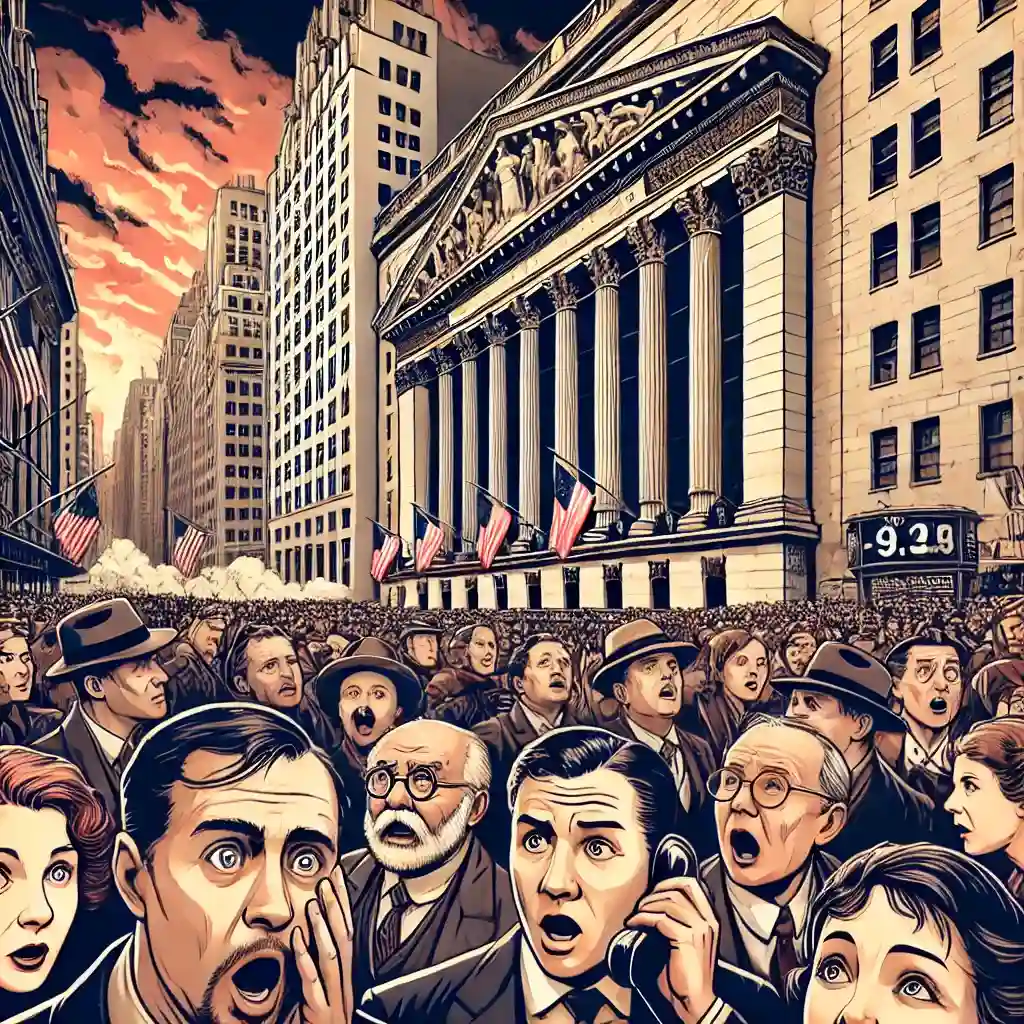
Imagine you’re an investor back in 1929. You’ve got a fancy suit, maybe even a cool hat, and you’re feeling on top of the world. Then, suddenly, your stocks start tanking. People were literally sprinting to Wall Street, yelling, and trying to sell everything they owned. Some investors thought they could solve things by throwing even more money at the problem, but spoiler alert: it didn’t work. In fact, the panic spread faster than a viral cat video today. The fear was real, and it was spreading like wildfire, leading to everyone thinking: “Is this the end of the world or what?”
Q1: What are your thoughts on this part of the article?
- Sample Answer: “It was really chaotic, and I can imagine the panic everyone felt. The way people rushed to Wall Street must have been intense.”
Q2: Please summarize this article.
- Sample Answer: “People panicked and rushed to Wall Street, trying to sell their stocks. It was total chaos.”
Q3.Let me know if you have any questions.
2. 人々はどう反応したのか?
1929年の投資家だと想像してみてください。素敵なスーツを着て、もしかしたらカッコいい帽子もかぶって、世界を征服したような気分です。でも突然、株価が暴落し始めます。人々は文字通りウォール街に駆けつけ、大声で叫びながら持っているものを全部売ろうとしていました。中にはもっとお金を投入して問題を解決しようとした投資家もいましたが、ネタバレすると、それはうまくいきませんでした。実際、パニックは今日のバイラル猫動画よりも速く広がりました。その恐怖は現実であり、まるで野火のように広がり、皆が「これって世界の終わりなのか?」と思うほどでした。
Now, let’s talk using idioms.
・Let the students choose one favorite idiom and make an example sentence.
1.“Feeling on top of the world”このイディオムは「非常に幸せで、自信に満ちている」という意味です。投資家が成功していると感じていた状況を表現しています。
- 例文: “After getting that promotion, I was feeling on top of the world.”
(その昇進を受けて、私はとても幸せな気分でした。)
2.“Stocks start tanking”Tanking”は「急激に落ち込む」または「悪化する」という意味で、特に株式市場の状況を説明するのに使われます。
- 例文: “The company’s stock started tanking after the negative news.”
(その悪いニュースの後、会社の株価は急落しました。)
3.“Throwing even more money at the problem”これは「問題を解決するためにお金を注ぎ込むが、必ずしも効果がない」という意味の表現です。
- 例文: “They tried to fix the project by throwing more money at it, but it didn’t help.”
(彼らはプロジェクトを解決するためにさらにお金を注ぎ込みましたが、効果はありませんでした。)
3. Why Should We Care Today?
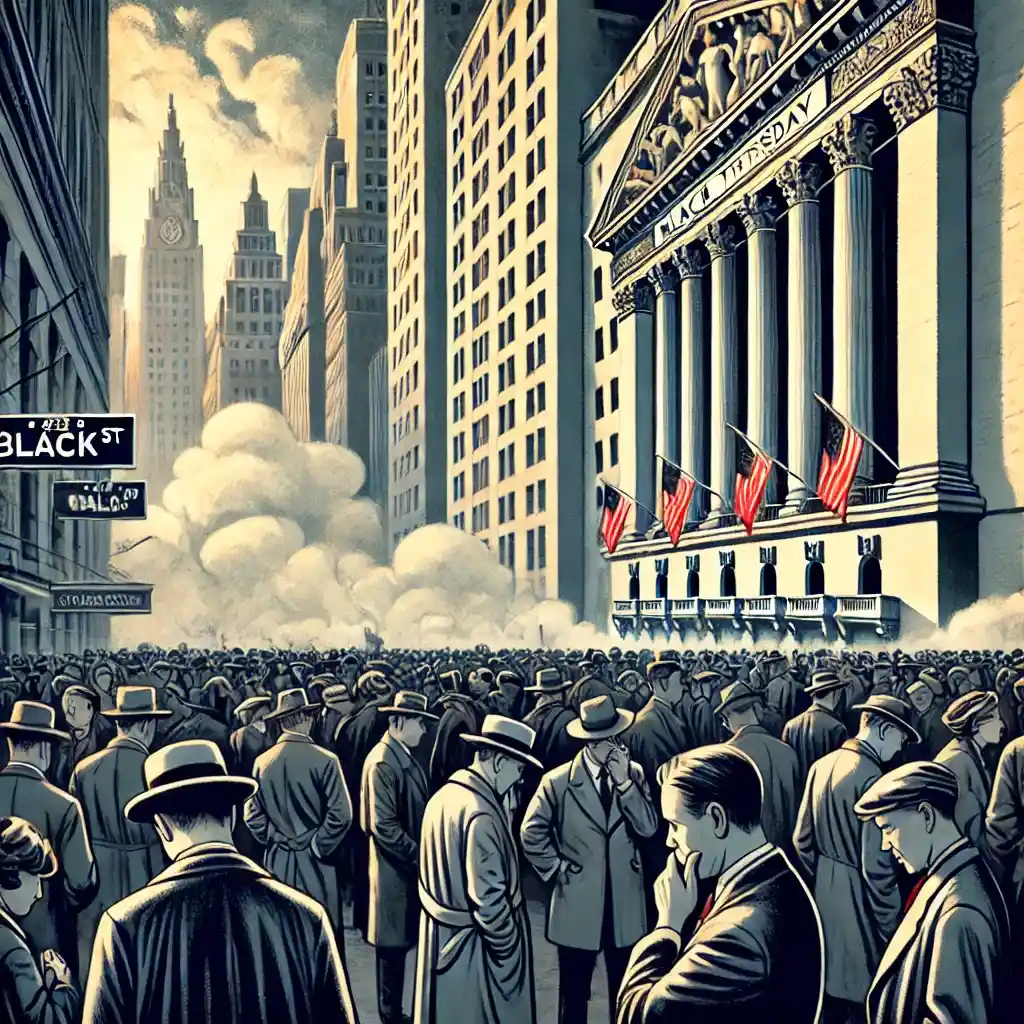
You might be wondering, “Okay, but why does this even matter now?” Well, my friend, Black Thursday is like the ultimate reminder of why we need to be smart with our money. It’s the classic “don’t put all your eggs in one basket” situation. Plus, it shaped a lot of the financial rules we have today. Back then, people learned the hard way that buying stocks without actually knowing what you’re doing can lead to… well, disaster. So, the next time you’re thinking about throwing all your cash into some meme stock, just remember: Black Thursday was like the world’s biggest “Oops, maybe that wasn’t such a good idea” moment.
3. なぜ今も気にするべきなのか?
「さて、でもこれは今に何の関係があるの?」と思うかもしれませんね。まあ、友達よ、暗黒の木曜日はお金の扱いに賢くなるべきだという究極のリマインダーのようなものです。典型的な「卵をすべて一つのバスケットに入れるな」という状況です。それに、当時の出来事は現在の多くの金融ルールを形作りました。当時、人々は株を買う際に本当に何をしているか分からないまま行動すると、どうなるかを痛い目で学んだのです。ですから、次に全財産をどこかのミーム株に投資しようと思ったときは、暗黒の木曜日が世界最大の「おっとっと、これは良くなかったかも」という瞬間だったことを思い出してください。
Q1.What are your thoughts on this part of the article?
・Sample Answer: “It’s a good reminder about why we need to be careful with our money. The comparison to modern investing was relatable and made the lesson clear.”
Q2.Please summarize this article.
・Sample Answer: “Black Thursday shows why we should be careful with money. It reminds us not to put all our eggs in one basket. Learn from past mistakes.”
Q3.Let me know if you have any questions.
Now, let’s talk using idioms.
・Let the students choose one favorite idiom and make an example sentence.
1.“Don’t put all your eggs in one basket”このイディオムは「リスクを分散させるべきで、一つのことに全てを賭けない方が良い」という意味です。特に投資などでリスクを減らすためのアドバイスとしてよく使われます。
- 例文: “When investing, it’s better not to put all your eggs in one basket.”
(投資する際には、一つのものに全てを賭けない方が良い。)
2.“Learned the hard way”これは「失敗や痛みを伴って学ぶ」という意味のイディオムです。経験を通して苦労して学んだことを指します。
- 例文: “He learned the hard way that you can’t trust everyone.”
(彼はすべての人を信頼してはいけないと苦労して学んだ。)
3.“Throwing all your cash into”これは「全てのお金を何かに投じる」という意味の表現で、リスクのある行動を強調しています。
- 例文: “She threw all her cash into that new business idea.”
(彼女はその新しいビジネスアイデアに全てのお金を投じた。)
4.“Oops, maybe that wasn’t such a good idea”このフレーズは後悔を表現するために使われます。「おっと、あれは良いアイデアじゃなかったかも」という感じで、過去の判断を軽く後悔していることを示します。
- 例文: “After eating the entire cake, I thought, ‘Oops, maybe that wasn’t such a good idea.'”
(ケーキを全部食べた後で、「おっと、あれは良いアイデアじゃなかったかも」と思った。)
4. Discussion Questions
If you have extra time, use this section.
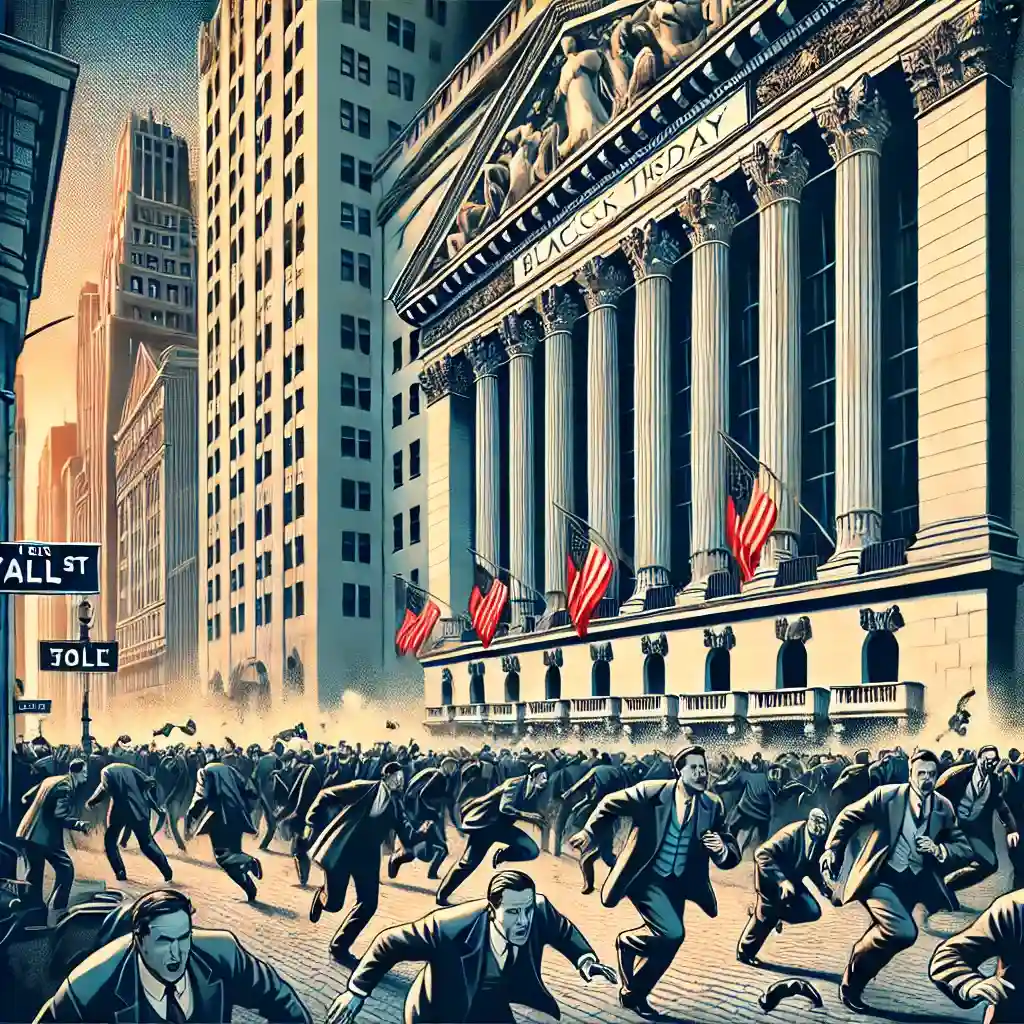
- What would you do if you suddenly lost all your money in one day?
- Sample Answer: “Honestly, I’d probably freak out for a bit and then try to figure out how to get back on track. Maybe take a break and eat a lot of ice cream first.”
- Why do you think people called it ‘Black Thursday’?
- Sample Answer: “It’s probably because it was such a dark day for investors. Imagine waking up thinking it’s just another Thursday and then, bam, you’re broke. Not fun.”
- What lessons do you think people learned from Black Thursday?
- Sample Answer: “Don’t panic-sell, and maybe don’t put all your money in one thing. Also, having a backup plan sounds pretty smart!”
質問1:
「もし突然1日ですべてのお金を失ったらどうしますか?」
サンプル回答: 「正直、まずはちょっとパニックになると思います。それからどうやって立ち直るか考えるでしょうね。まずはアイスクリームをたくさん食べて一休みするかも。」
質問2:
「なぜ人々は『暗黒の木曜日』と呼んだと思いますか?」
サンプル回答: 「たぶん、投資家にとってとても暗い日だったからじゃないでしょうか。ただの木曜日だと思って目覚めたら、突然破産してしまうなんて。全然楽しくないですよね。」
質問3:
「暗黒の木曜日からどんな教訓を学んだと思いますか?」
サンプル回答: 「パニック売りをしないこと、そしてお金を全部一つのものに投じないことです。それに、バックアッププランを持つのが賢明だということもですね。」
